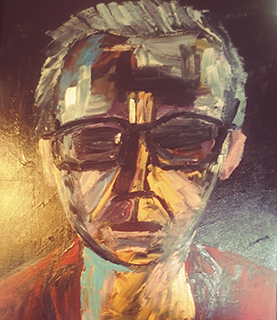George Franklin
Old Man Death Wants to Go Out for Breakfast
He orders fried eggs and toast and says he had a really good night. I don’t even want to know what that could mean, but he’s careful to make sure I’ve ordered enough. I’m not a big breakfast eater, so coffee and rolls are just fine. I prefer to smell bacon than to eat it. Old Man Death is impatient while we wait. He tells me that the waitress is worried about her father’s health but doesn’t say more. I remind myself to double her tip. He ordered his eggs sunny side up, but when they arrive, they’re over easy. He says it doesn’t matter, he’s just hungry, and asks for Tabasco. The coffee is the typically thin stuff you get from a diner, and I put three of those little plastic thimbles of half & half in to make it taste like something. Old Man Death notices and talks about how much stronger coffee used to be. He asks me if I remember The Morning Call in New Orleans fifty years ago, with the beignets and silver pitchers of hot milk. We both laugh and shake our heads. He tells me how he watched Edward Hopper paint Nighthawks and that, if I look closely, he’s standing in the dark outside. But Old Man Death must be getting confused. I’ve looked at that painting over and over, and I’ve never seen him.
The Work of Grieving
Freud talks about the work of grieving, but
I’ve never really known how or even what
It feels like. I lost my grandfather, my
Great aunt, my father, mother, and friends
I knew for years. I went to their funerals,
And from time to time, wished they were here,
Wished I could tell them a story about something
I saw or did. For some reason, it never occurred
To me that they might be interested in politics
Or the evening news, which says something,
I’m sure, about how shallow I am. I can
Read how Walter Benjamin killed himself
When it looked like he’d be turned back
To France, handed over to the Nazis, and
The thought of it makes me want to cry. Stories
From the Cambodian genocide affect me
The same way. But I didn’t cry for my grandfather
Or anyone else except two dogs the vet killed
Because they were ill with no hope of getting better.
Half the people I knew in college aren’t
In reunion pictures anymore. The old photos
Show them with hairstyles and clothes
From the 1970s, and the newer ones show them—
Or at least some do—with gray hair and t-shirts
That look out of place, old men dressed up
In motorcycle jackets. There are women who
Were still girls when I knew them, who disappeared
Without a word from me or from them,
But I haven’t grieved anyone. All I can do
Is think about their names, and occasionally,
Take a look at some pictures.
When I disappear
As they have, don’t feel you have to mourn me.
I haven’t grieved anyone.
Night Train to St. Louis
Crossing the Ozarks in the evening, we took
On trout to serve at dinner, with brown butter
And slivered almonds. My father had a highball,
My mother a coke. My grandfather drank iced tea.
Suitcases were large then, folded jackets
And ironed shirts, extra pairs of shoes, pajamas.
At night, I watched black fields and sky pass us
Going the other way. There was nothing remarkable
In any of this. The earth turned on its axis,
And the tracks, if I could have seen them, would’ve
Converged at infinity, a point visible to painters
And the very young. But I was not a painter, only
A pair of eyes sliding into sleep, a train
Pulling into a station, a few lights, many stars.
George Franklin is the author of seven poetry collections, including his recent: What the Angel Saw, What the Saint Refused from Sheila-Na-Gig Editions. He practices law in Miami, is a translations editor for Cagibi and a guest editor for Sheila-Na-Gig Online, teaches poetry workshops in Florida prisons, and co-translated, along with the author, Ximena Gómez's Último día/Last Day. In 2023, he was the first prize winner of the W.B. Yeats Poetry Prize, and his work has been featured on the public radio podcast The Slowdown.
